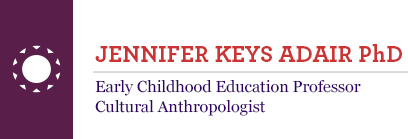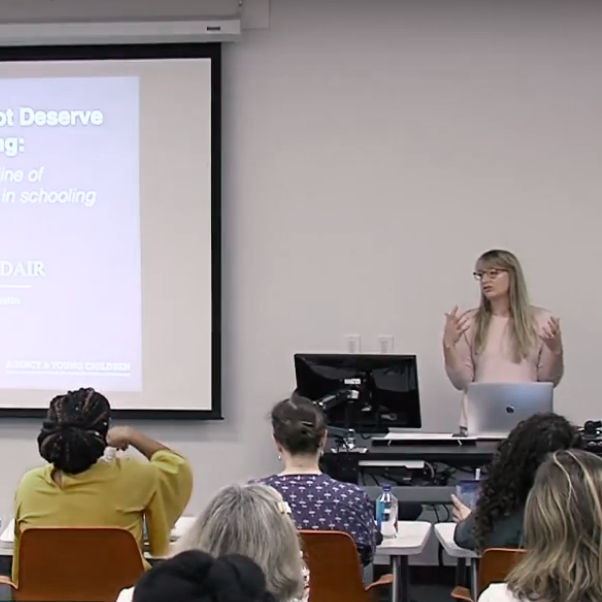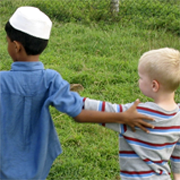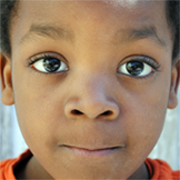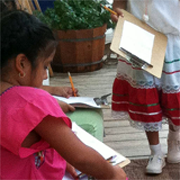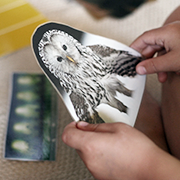Articles & Media
Scholars and activists have also critiqued the original word-gap study’s methodology and the way its findings have been interpreted by policymakers. Critics say that policies that grew out of simplistic interpretations of this study were racist, classist, and simply ineffective. One 2017study published in the Harvard Education Review even found that the word-gap research had the unintended consequence of perpetuating negative stereotypes about the children of Latino immigrants, with teachers in classrooms serving such students resorting to less-sophisticated instruction.
Did you know that kids growing up in poverty hear 30 million fewer words by age 3? Since 1992, this finding has, with unusual power, shaped the way educators, parents and policymakers think about educating poor children. But did you know that the number comes from just one study, begun almost 40 years ago, with just 42 families? That some people argue it contained a built-in racial bias?
Why Mendez Still Matters: Meet the school desegregation case that still affects ELL instruction today.
In 1947, a full seven years before Brown v. Board of Education of Topeka, Mendez and the other plaintiffs struck one of the earliest blows against school segregation when a federal court in California ruled that the segregation was illegal. It was a great victory, a precursor to the Brown decision and a landmark triumph in the fight for Mexican-American civil rights.
Why a key research finding is ruining teaching in Texas
Three Texas researchers spent a year watching and then recording Hispanic first-graders from low-income families as they experienced an unusual approach to learning. They were encouraged to initiate projects, ask questions without raising their hands, give feedback to one another, and decide where and with whom to work.
Rethinking the word gap
Some researchers have begun to question the benefits of word gap advocacy. This new line of critique suggests word gap efforts may reinforce damaging deficit perspectives about low-income families and linguistically diverse students. A study published in the most recent issue of the Harvard Education Review found that acceptance of the word gap drove deficit-based thinking among educators, which in turn had negative effects on the instruction offered to low-income Latinx immigrant children. The authors of the study—Jennifer Keys Adair, Kiyomi Sánchez-Suzuki Colegrove and Molly E. McManus—wrote that they were surprised to unearth evidence of educators’ deficit-based conceptions about Latinx students. As they wrote,“vocabulary unexpectedly emerged as a justification for discrimination in classrooms serving mostly children of Latinx immigrants.”
Who Does and Does Not Deserve Agentic Learning: Charles Mills and the Line of Personhood/Subpersonhood in Schooling
This talk considers learning as “opportunities” that are constructed in and translated through white supremacy. Using an historical interrogation provided by the work of Charles Mills, Adair argues that although learning and development are presented as an amoral, biological or even constructivist set of events, their application to children’s lives can be one of constructing and reifying personhood and subpersonhood along racial lines. Using interview data with young children, teachers, and directors in Texas and the particular case of the “word gap” argument, Adair shows how denying children of color certain learning experiences is often justified by a perceived “lack of development.” This denial often 1) prevents children from demonstrating their full range of capabilities and 2) blames children and families for disparity instead of working to improve unjust institutions and systems.
White Supremacists Still Exist. Here's What White Parents Can Do About It.
Following the deadly white supremacist rally in Charlottesville, Virginia over the weekend, many Americans are wondering what they can do to push back against hatred and bigotry in 2017. We spoke to parents, activists, educators and allies about how to teach kids to combat racism. Here are 15 takeaways for parents to keep in mind.
White Parents Can Help Fight Racial Injustice
Here's How to Talk to Your Kids About Terrorism
It's been a nasty news cycle, dominated by images from Ataturk International Airport in Istanbul, a modern cosmopolitan hub connecting the west to the Middle East. The pictures from the attack are not so visually graphic as they are psychologically so. As adults in this age of terrorism, we've almost become inured to such scenes. But our kids, not so much. So, how do we answer our children's questions about terrorist attacks without oversimplifying or worse?
What to look for in a high-quality preschool
Early education has been proved to be essential to a child's learning development, but teacher turnover is high because of low pay, the department's report said. Evidence shows that when children are enrolled in preschools with a low teacher turnover rate and higher pay, they engage in more positive interactions with their teachers and peers.
We Know Pre-K Is Essential, So Why Do the Teachers Earn Only $28,000?
Experts and studies confirm it as fact: Placing toddlers in structured, quality preschool programs is the foundation of a good education, which in turn can help break the cycle of poverty.Yet, a White House report released this week shows that despite preschool being critical to a young child’s health, development, and school readiness, many early childhood educators are earning half as much as elementary school teachers—paychecks low enough to qualify them for government assistance.
Obama calls for limits on school testing. Here’s why.
Sometimes advocates for standardized testing argue that tests, including benchmark or “school readiness” tests help catch learning problems early. Yet, usually, it is a smart, thoughtful, observant teacher who, by watching, engaging and interacting with children each day, spots someone having trouble with oral language, fine motor skills, conflict or letter recognition. So much testing also puts us at risk of losing teachers.The National Education Association (NEA) reports that nearly half of teachers want to leave the profession because of standardized testing.
Why disciplining kids can be so tricky for parents and teachers
Disciplining works if it is not over the top and children understand the point of it. Highlights magazine’s annual State of Kids survey found that a majority of children appreciated being disciplined and believed that it helped them behave better.
Labeling Young Children With 'Word Gap' Language Is Harmful
When high school student Coby Burren noticed slaves referred to as "immigrant workers" in his Texas textbook, he called his mother who then called out the publisher. Using "workers" instead of "slaves" to describe migration from West Africa to the United States, they argued, is yet another way to make something horrible sound less horrible.
Discrimination at School Harms Development of Young ELLs, Study Says
A new report from the Migration Policy Institute outlines the types of personal and structural discrimination that young children of immigrants may experience at school. The study from the organization's National Center on Immigrant Integration Policy makes the case that the experiences of young children of immigrants, many of whom are English-language learners, from pre-kindergarten through 3rd grade play a significant role in determining their academic future.
How Young Children of Immigrants Face Discrimination At School.
The first years of any child’s education are an impressionable time. They lay the foundation for how a student conceives of school — and how he or she views his or herself in relation to the larger community. However, many young children of immigrants — who account for around a quarter of all children under age 8 in the U.S. — face discrimination at school during this formative period.
Discrimination begins early and immigrant preschoolers notice, report says.
Preschoolers from immigrant families can face discrimination from teachers, administrators, even other children who are not immigrants, according to a new report from the Migration Policy Institute.
Study: Children of Immigrants Experience Discrimination in Schools Early On
Fewer options for preschool, inexperienced teachers and low-performing schools are just some of the disadvantages children of immigrants face early in their education, a new Migration Policy Institute report points out. The report, “The Impact of Discrimination on the Early Schooling Experiences of Children from Immigrant Families,” examines the school environments and learning opportunities afforded to children of immigrants in the United States, comparing them with the experiences of their peers with U.S.-born parents.
Study: Children of Immigrants Experience Discrimination in Schools Early On
Fewer options for preschool, inexperienced teachers and low-performing schools are just some of the disadvantages children of immigrants face early in their education, a new Migration Policy Institute report points out. The report, “The Impact of Discrimination on the Early Schooling Experiences of Children from Immigrant Families,” examines the school environments and learning opportunities afforded to children of immigrants in the United States, comparing them with the experiences of their peers with U.S.-born parents.
Growing Up in America: The Extent and Impacts of Discrimination on Young Children from Immigrant Families
On this webinar, researchers explore the types of discrimination that young children of immigrants may experience, the related educational, psychological, and social impacts, and recommendations for addressing discrimination.
"Is Your Kid Having Fun Reading? Hear are some tips." * w/ Michiko Hikida
Not being able to read is a problem but so is not liking to read. Reading for pleasure has been linked to growth across many domains, including greater reading confidence, gains in general knowledge and insights that help disrupt negative stereotypes. Engagement with books not only improves social relationships but also builds empathy.
Why Stopping Deportation Is the Right Thing to Do *w/ Sam Adair
It is estimated that there are between 3.7 and 5 million people who would benefit from the DAPA and expanded DACA programs. These programs would provide a temporary avenue for adults — often parents of school-age children — who are here working and living in fear of deportation. And yet lots of people are fighting against these families.
Top Teachers Required for All Our Small Children
In a female dominated profession, where 95.5 percent of all child care workers are women, we often assume anyone patient enough can work with children.
Texas needs teachers with early childhood certification
The new governor of Texas ran on a pre-kindergarten platform. And he announced early childhood education as a main priority. Yet, his plan does little to help ensure teachers have the knowledge necessary to be effective teachers of young children.
Kids must learn Black History Movements and Heroes
Childhood lessons about black history often overlook important but less well-known figures including (from left) Bayard Rustin, Andrew Young, (second from right) James Farmer and John Lewis, who join Rep. William Fitts Ryan (center) in New York in 1965 during the Civil Rights Movement.
The Chicago Reporter
Jennifer Keys Adair, Ph.D., is a professor of Early Childhood Education at The University of Texas at Austin, a young scholar fellow with the Foundation for Child Development and a public voices fellow with The OpEd Project.
In test-based systems, even young kids resist learning
Children show a vastly improved ability to absorb knowledge when they are allowed to make some of their own decisions about what they want to learn.
Testing, in other words, gets in the way – and worse.
Training Teachers To Face Impoverished Students
A report released in January shows that the number of impoverished school-aged children is on the rise. In some states, the majority of public school students are living in poverty. What does this mean for preparing new teachers to enter the classroom? Two guests give us their recommendations.
Preparing Teachers for an Unfortunate Reality: Impoverished Students
How can we modify education programs to make sure that our teachers look beyond simple stereotypes about the perceived deficits of poor students?
How to Teach Tolerance
By age 9, children have prejudices that are “highly resistant to change.” So if we want to fight racism and violence (particularly against black men), we need to teach diversity much earlier.
Holmes, Johnson, Keys Adair: Tolerance education should begin in kindergarten
AUSTIN, Texas >> By age 9, children have prejudices that are “highly resistant to change.” So if we want to fight racism and violence (particularly against black men), we need to teach diversity much earlier.
To avoid another Ferguson, we need to start teaching tolerance … in kindergarten
By age 9, children have prejudices that are “highly resistant to change.” So if we want to fight racism and violence (particularly against black men), we need to teach diversity much earlier.
Fighting for Farm Workers at Our Dinner Table
The movie Food Chains should dramatically raise our collective consciousness - and conscience - about how our food is produced. We need to establish a "slave-free" section at our supermarkets.
Kids and technology: Three household principles
It is easy for kids to plug into content labeled as 'educational' on tablets and smart phones, but partnering screen time with social interaction might be the best way to help kids learn without isolating themselves.
White Parents Should Talk to Their Kids About Discrimination
In the aftermath of Ferguson police officer Darren Wilson shooting and killing Michael Brown, I have been thinking about what young children are picking up from their parents, the news and their teachers about being a good white person.
My name is Jennifer Keys Adair. This is my idea for a core conversation session at SXSW Interactive 2015. I'm an early childhood professor trying to get more sophisticated online content delivery for pre and early readers.
Mott Haven parents support mayor’s pre-k push
Local families need more early education, they say without the Abraham House afterschool program on Willis Avenue, Evelyn Gil says she never would have earned a scholarship and a chance to study in London.
Project Based Learning
Here’s a description of a classroom where a wealth of learning occurs. Students choose small groups and the teacher asks them to plan a vacation. They can go anywhere!
Listening Carefully to Parents and Communities
Listening Carefully to Parents and Communities, presents research which shows that immigrant parents and early childhood educators often have vastly differing notions of what should happen in preschool. The goal of this presentation is to acknowledge assumptions and practices that can marginalize parents and families as well as outline ideas and strategies that can empower them in their interactions with schools.
The Dilemma of Cultural Responsiveness and Professionalization: Listening Closer to Immigrant Teachers Who Teach Children of Recent Immigrants
Education researcher Jennifer Keys Adair discusses her co-authored TCRecord article.
